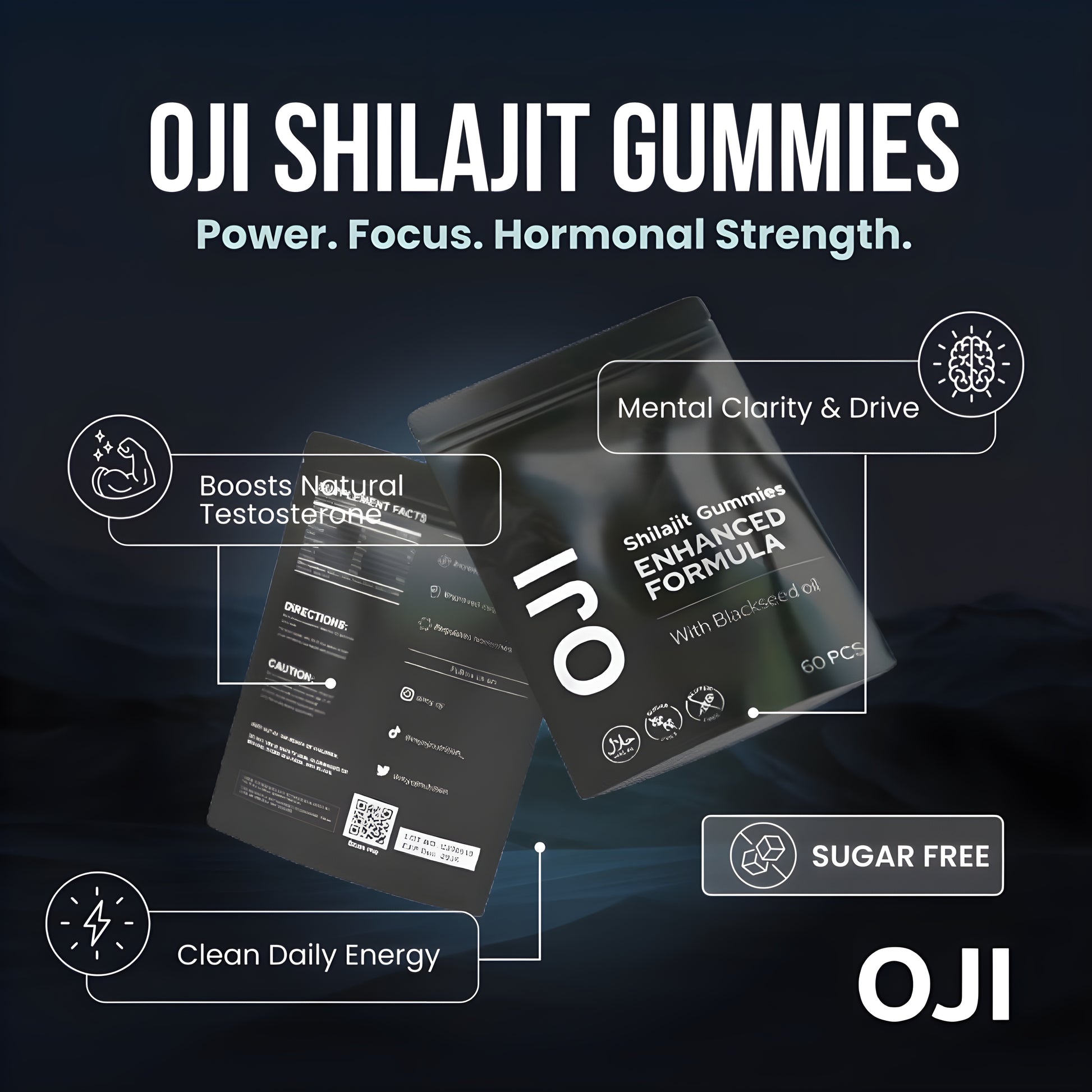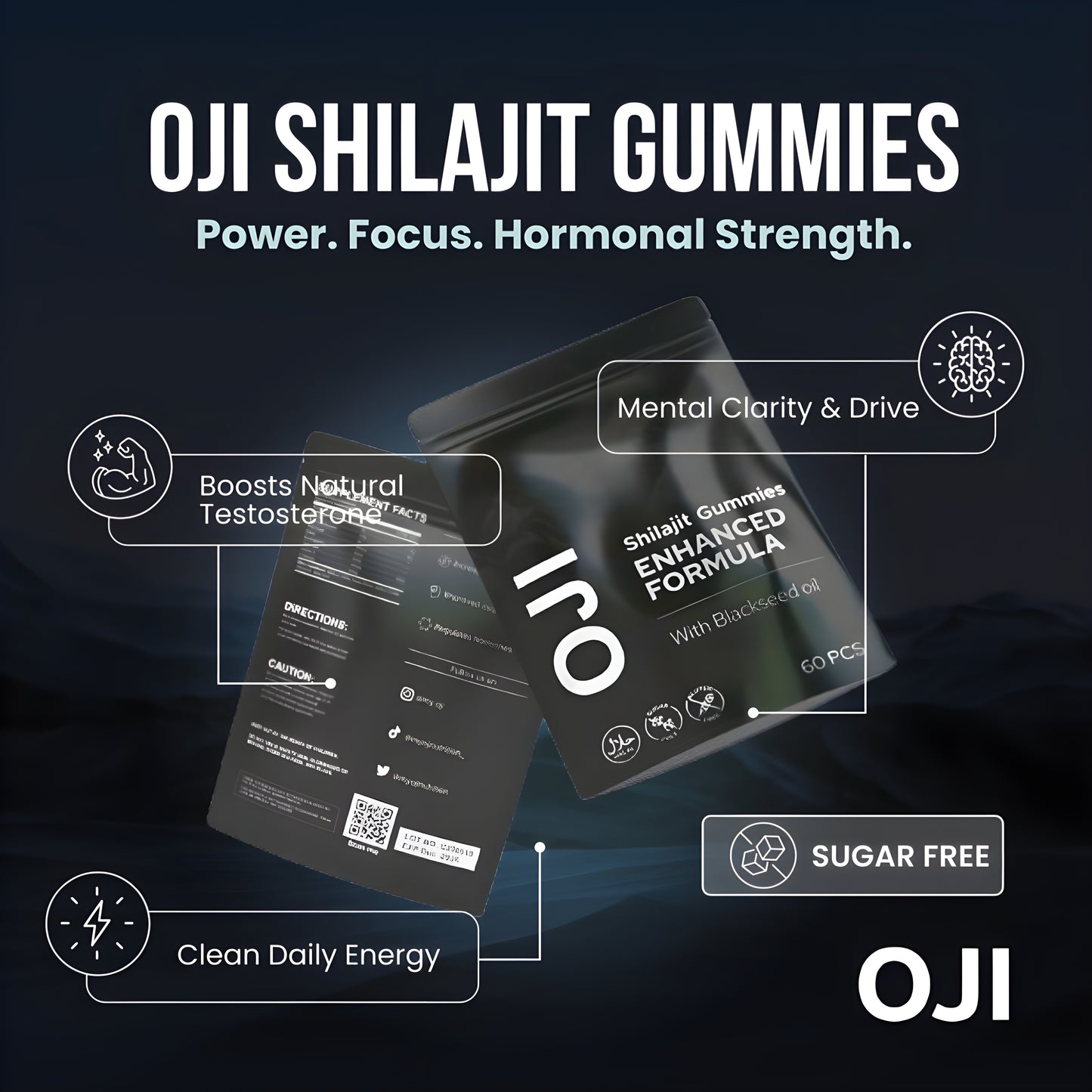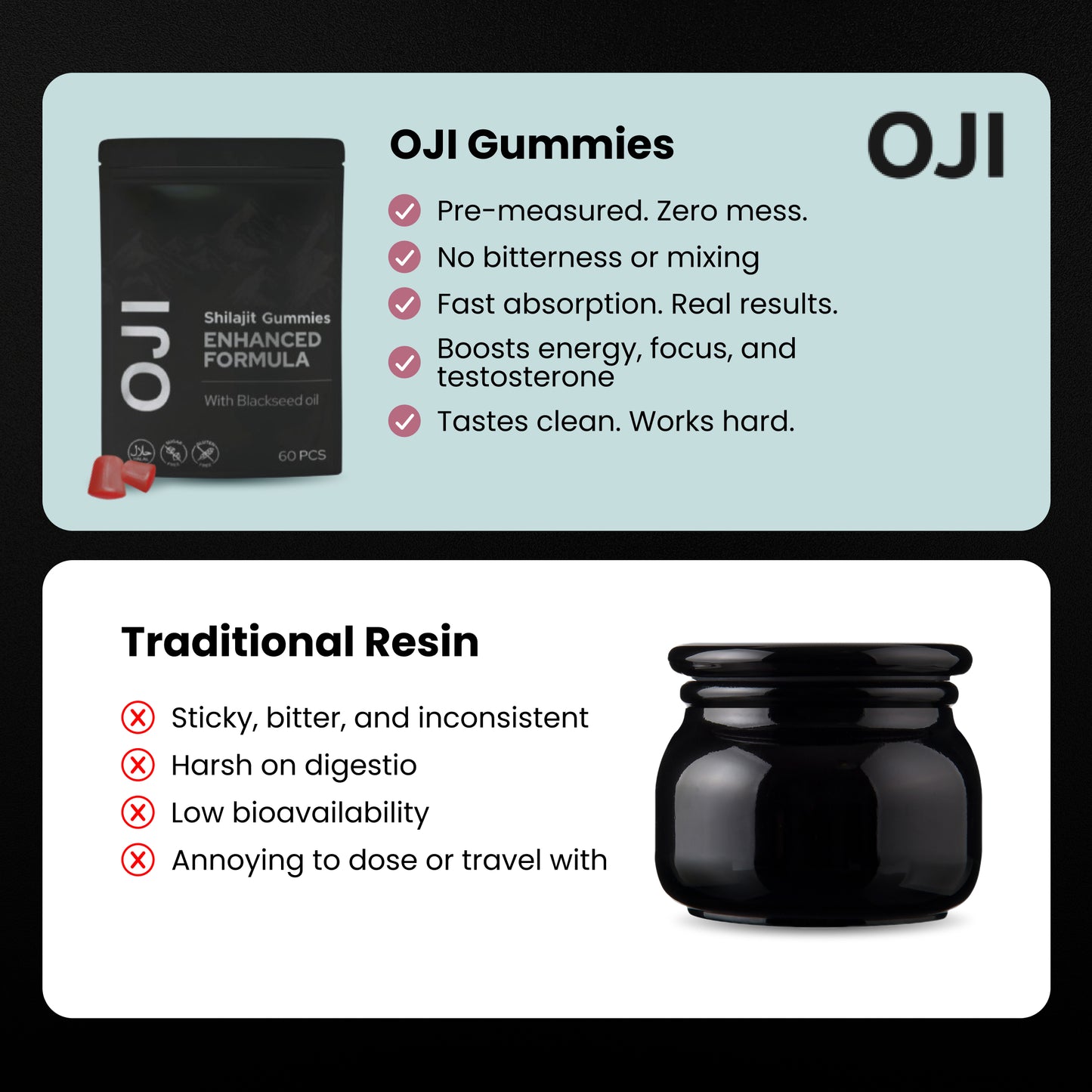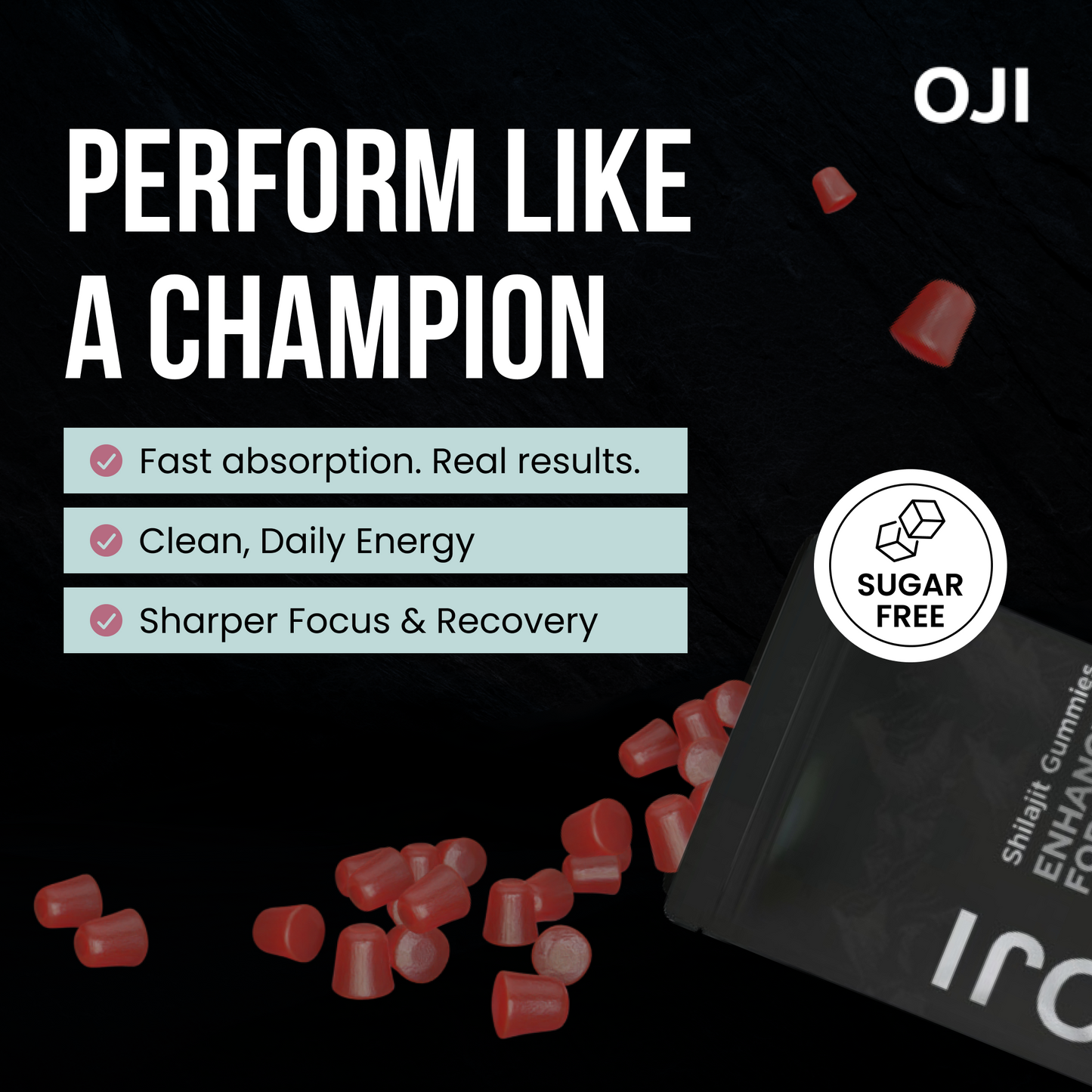To gain an athletic edge, you must choose supplements with solid science behind them. Start with Creatine Monohydrate for power, Whey Protein for muscle repair, and Caffeine for an endurance kick. But the perfect supplement for you is the one that fits your sport, your diet, and your specific goals. This guide will show you how to take action and choose wisely.
Decoding Supplements For Peak Athletic Performance
Stepping into the world of sports nutrition can feel like a maze. To cut through the marketing noise and find what actually works, you need a clear plan of action.
First, understand that supplements are there to complement your training and nutrition plan, not to replace them.
Think of it like building a house. Your training is the blueprint. The food you eat every day—good-quality protein, carbs, and healthy fats—is the concrete foundation. Supplements are the high-tech power tools. Use them to get the job done faster and with more precision, but don't expect them to build the house on their own.
The Food-First Principle
Before adding any supplement to your routine, perform an honest audit of your diet. A great nutrition plan is the most powerful performance enhancer you'll ever find.
Use supplements strategically to fill a specific gap in your diet or to provide a targeted boost that’s tough to get from food alone.
Action Step: Start with a "food-first" approach. Ensure your body gets the full spectrum of macronutrients, micronutrients, and fibre it needs to function at its best. Make supplements the final 5-10% of your strategy, not the 90% you rely on.
With the supplement industry absolutely booming, it’s no shock that so many athletes are curious. In Great Britain alone, it’s estimated that around 24.24 million people over 15 use vitamins and supplements. This interest is driving huge market growth, with projections hitting nearly USD 9.65 billion by 2033. If you're interested in the numbers, you can dig deeper into the UK dietary supplements market report.
To give you an actionable overview of the most effective, evidence-backed options, use this table to break down the top-tier supplements.
Quick Guide To Tier-1 Athletic Supplements
This table summarises the heavy hitters in the world of sports supplements. Use it to find what you need based on your primary training goal.
| Supplement | Primary Benefit | Action: Use For |
|---|---|---|
| Creatine Monohydrate | Power & Strength | Explosive sports, weightlifting, sprinting |
| Whey Protein | Muscle Repair & Growth | Post-workout recovery, building muscle mass |
| Caffeine | Endurance & Focus | Long-duration events, pre-workout energy |
| Beta-Alanine | Muscular Endurance | High-intensity efforts (1-4 minutes) |
| Nitrate (from beetroot) | Blood Flow & Efficiency | Endurance and team sports |
| Omega-3 Fatty Acids | Recovery & Joint Health | Reducing inflammation, overall health |
Think of this as your starting line-up. These are the supplements with the most research backing their effectiveness for dedicated athletes.
Identifying Your True Needs
To use supplements effectively, you must be strategic. Instead of jumping on every new trend, start by asking yourself these direct questions:
- What am I actually trying to achieve? Do I need explosive strength for the rugby pitch, better endurance for a marathon, or faster recovery between gym sessions?
- What does my sport demand? Recognise that a powerlifter’s needs are a world away from a long-distance cyclist’s.
- Where are the gaps in my diet? For example, if you're a plant-based athlete, determine if you are getting enough creatine or vitamin B12 from food alone.
Answering these questions creates a personal roadmap. It points you towards supplements that will genuinely add value, rather than just drain your wallet. Use this guide as your playbook to make smart, evidence-based choices that will support your ambition.
Building Your Foundation For Strength And Power
To build real strength and explosive power, you must give your muscles the raw materials they need. Prioritise your diet first, then use key supplements as powerful catalysts to push your body to perform at its peak and rebuild stronger.
For strength, focus on two supplements that stand above the rest: Creatine Monohydrate and Protein Powder. They are the most researched and proven tools in an athlete's arsenal. They work in different but complementary ways to help you go harder in the gym and recover faster.
Here's how to use them properly.
Creatine Monohydrate: The Rapid Energy Recharger
Imagine your muscles have tiny, rechargeable batteries that provide instant energy (ATP) for heavy lifting or sprinting. During intense, short-burst efforts, you burn through this energy incredibly fast.
Creatine acts as a super-fast charging station for those batteries.
By taking creatine, you increase your muscles’ stores of phosphocreatine. This molecule instantly recharges depleted ATP, giving you the fuel to sustain high-intensity effort for a few crucial seconds longer. That translates to one or two extra reps on a heavy set, which is exactly what triggers significant gains in strength and muscle over time.
For anyone looking to maximise power output, creatine is a non-negotiable. It isn't a steroid; it’s a natural compound that makes your body’s energy system more efficient.
How To Take Creatine Effectively
To get the full benefits, you need to fully saturate your muscles with creatine. Choose one of these two simple strategies.
- Action 1: The Loading Phase. For the fastest results, take 20 grams per day (split into four 5-gram servings) for 5-7 days. This quickly tops up your muscle stores. After the loading week, drop down to a daily maintenance dose of 3-5 grams.
- Action 2: The Slow and Steady Approach. To skip the loading phase, simply start with the maintenance dose of 3-5 grams per day. It will take around 3-4 weeks to reach full saturation, but you’ll get to the exact same place.
The most important step is consistency. Take your dose every single day, even on rest days, to keep your energy reserves full.
Protein Powder For Muscle Repair And Growth
After pushing your muscles to their limit, you must provide them with protein—the essential building blocks (amino acids) they need to repair and grow back stronger. While whole food should always be your main source, use protein powders as a convenient and effective way to hit your daily targets.
Forget the myth of the "anabolic window"—the idea that you must have a protein shake within 30-60 minutes post-workout. While post-workout protein is a good idea, the timing isn't that critical.
Action Step: Prioritise your total daily protein intake over precise timing. Think of the "anabolic window" as a large garage door that stays open for several hours. Your real goal is to consistently hit your daily protein target, spread throughout the day. A post-workout shake is a great option, but don't panic if you can't get to it immediately.
Choosing The Right Protein For You
Don't get overwhelmed by the options. Your choice boils down to a few key types. Select the best one for you based on your dietary needs, budget, and goals.
| Protein Type | Action: Choose If... | Key Characteristics |
|---|---|---|
| Whey Concentrate | You want a cost-effective, brilliant all-rounder. | Contains some lactose and fat. |
| Whey Isolate | You are lactose sensitive or have very lean goals. | Higher protein content, very little lactose or fat, digests quickly. |
| Casein | You want sustained protein release, especially before bed. | Digests very slowly, providing a steady drip-feed of amino acids. |
| Plant-Based Blends | You are vegan or avoid dairy. | Usually a mix (pea, rice, hemp) to create a complete amino acid profile. |
For most people, a good quality whey concentrate or isolate is the perfect place to start. If you’re on a plant-based diet, choose a blend of different protein sources to ensure you’re getting all the essential amino acids your muscles need.
How To Boost Endurance And Delay Fatigue
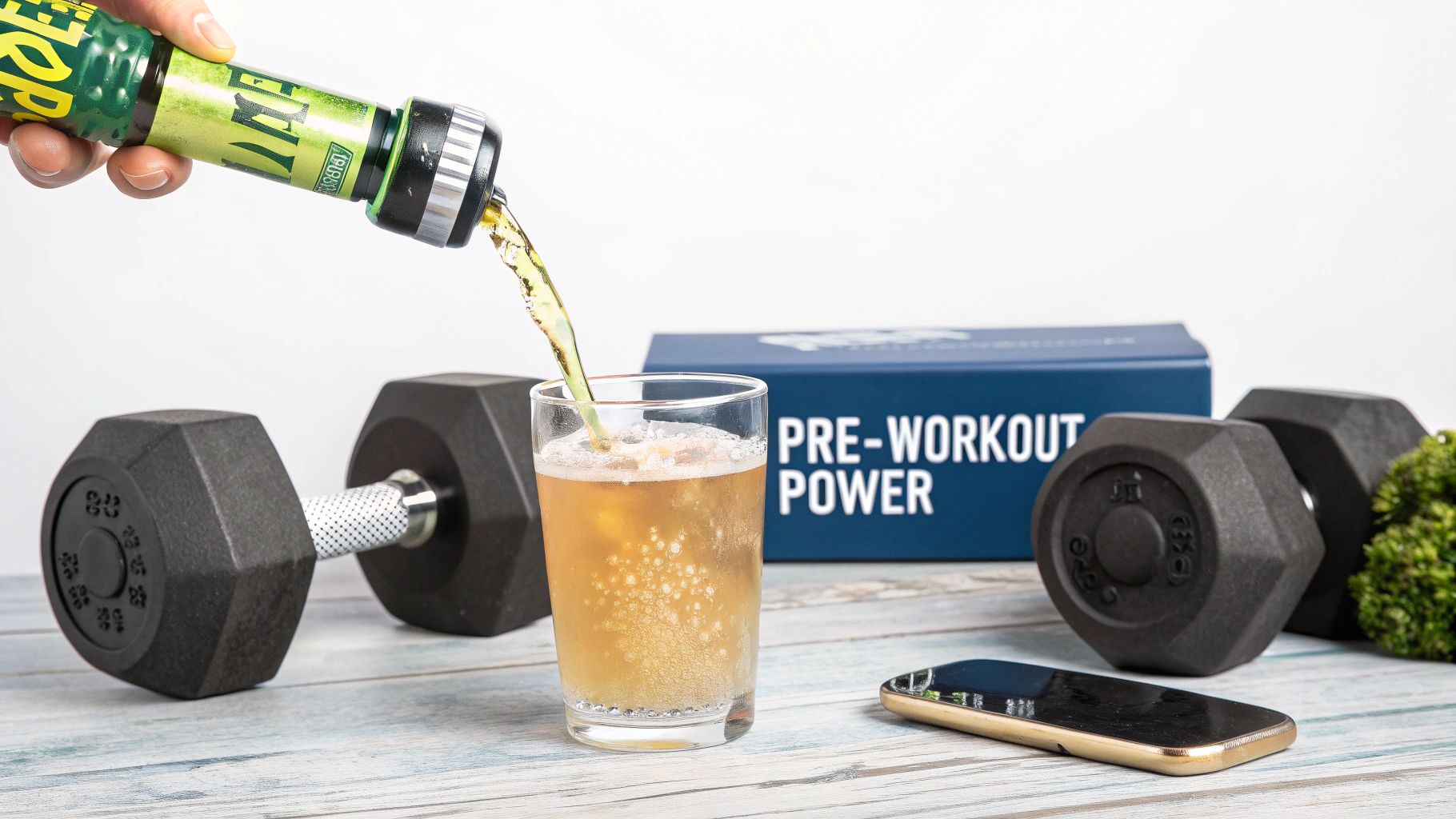
If you're a marathon runner, cyclist, or swimmer, your goal is to delay fatigue. While training and nutrition are the bedrock of performance, the right supplements can give you a significant, science-backed edge.
These aren't magic pills, but they target the specific factors that force you to slow down: muscle burn, exhaustion, and the struggle for oxygen. By addressing these limiters, you can hold a higher intensity for longer.
Beta-Alanine: The Muscle Burn Sponge
That searing burn in your muscles during an all-out effort is caused by a buildup of acid. Beta-alanine is your secret weapon against it.
When you take beta-alanine, your body uses it to create carnosine, a compound that acts like a sponge for muscle acid. Carnosine soaks up the acid, buffering the burn and letting you push harder for longer, especially in intense efforts lasting between one and four minutes.
Action Step: Beta-alanine works by accumulation, so a single dose won't work. You must load it daily for several weeks to build up enough carnosine in your muscles. Plan ahead and start taking it well before a key event or training block.
Caffeine: Your Pre-Workout Power-Up
Caffeine is one of the most effective and well-researched performance aids available. Its biggest benefit for endurance is lowering your Rate of Perceived Exertion (RPE)—in other words, it makes hard work feel easier.
By blocking specific receptors in your brain, caffeine stops you from feeling as tired as you actually are. This mental boost gives you the kick you need to push through when fatigue would normally tell you to back off.
Actionable Caffeine Timing Strategy
Follow this simple plan on big workout and race days to get the most out of caffeine without ruining your sleep.
- Calculate Your Dose: Aim for 3-6 mg of caffeine per kilogram of body weight. For a 70 kg athlete, that’s 210-420 mg. Always start at the low end of the range to assess your tolerance.
- Time It Right: Take your caffeine 30-60 minutes before you start. This gives it enough time to be absorbed and take effect when you need it most.
- Avoid Late Doses: If you train in the evening, be careful. Caffeine taken too close to bedtime can disrupt sleep, which is vital for recovery.
Nitrates: For Better Blood Flow
Nitrates, found in foods like beetroot, rocket, and spinach, make your body more efficient. When you consume them, your body converts them into nitric oxide.
Nitric oxide is a vasodilator, meaning it relaxes and widens your blood vessels. This allows more oxygen-rich blood to reach your working muscles, so they can produce energy more efficiently with less oxygen. We take a deeper dive into this and other aids in our guide on supplements for endurance.
Essentially, nitrates lower the energy cost of exercise. To get the best effect, load up for a few days before a big event.
Optimising Recovery To Maximise Your Gains
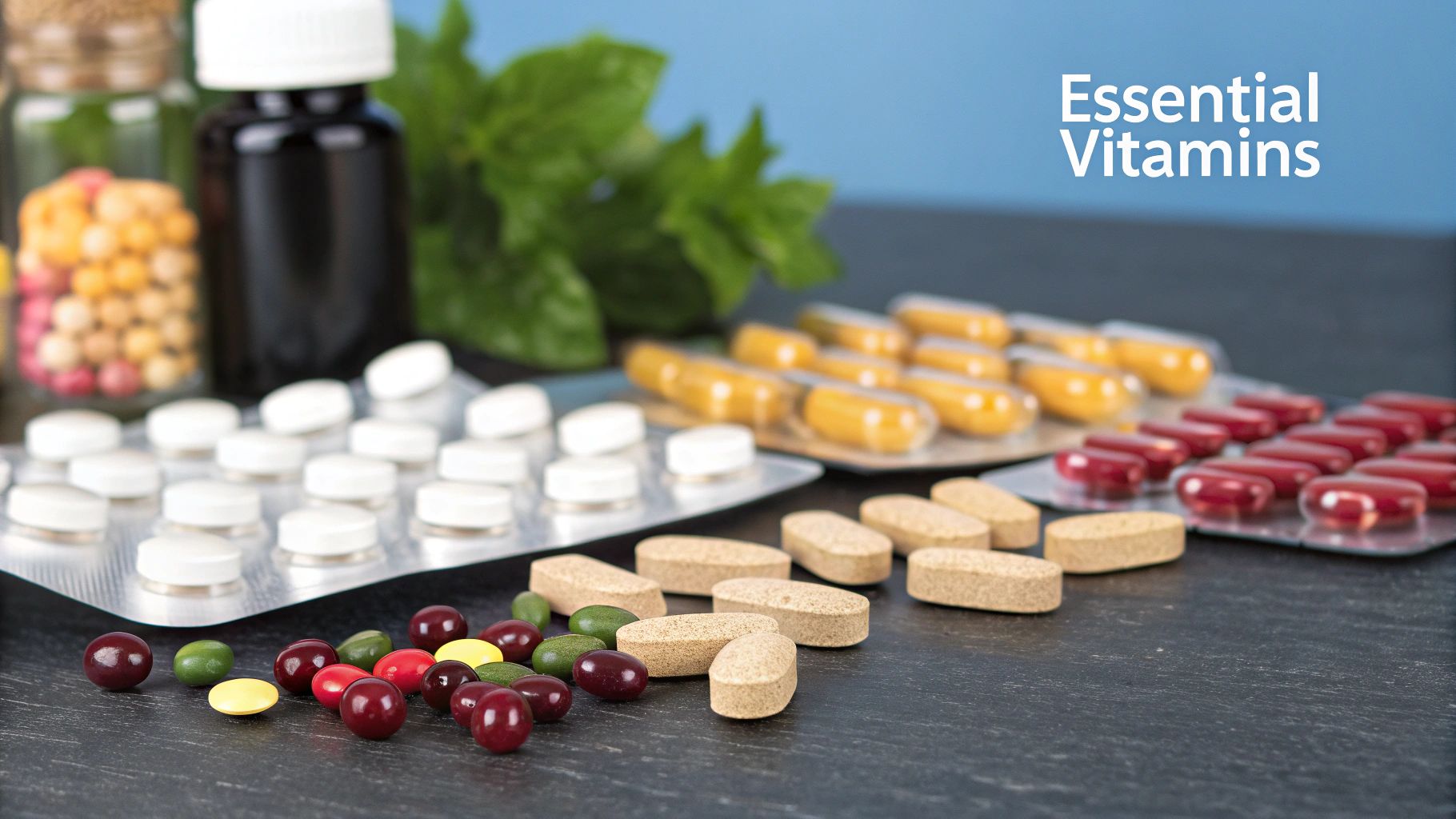
Hard training is only half the story; real progress happens during recovery. When you push your limits, you create tiny tears in your muscles. The repair process builds you back stronger, and the right supplements can speed this up.
While protein is the star player, other key nutrients are your support crew. Use them to manage inflammation, keep bones strong, and reduce soreness that can derail your next workout.
Your action plan for recovery isn’t just about feeling less stiff; it’s about being ready to perform again, consistently.
Omega-3 Fatty Acids To Fight Inflammation
Intense exercise causes inflammation, a normal part of the muscle-building signal. But when inflammation lingers, it leads to nagging soreness and slows recovery. This is where Omega-3 fatty acids come in.
Use Omega-3s, especially the EPA and DHA in fish oil, as your body's natural anti-inflammatory response. They help calm things down, reducing delayed onset muscle soreness (DOMS) and supporting your joints.
Action Step: When choosing an Omega-3 supplement, check the combined dose of EPA (eicosapentaenoic acid) and DHA (docosahexaenoic acid). Aim for 1-2 grams of combined EPA and DHA each day to get the anti-inflammatory benefits.
Vitamin D For Bone Health And Immunity
For any athlete training in the UK, getting enough Vitamin D from the sun is a challenge, especially in autumn and winter. This is critical, because Vitamin D is vital for absorbing calcium, the building block of strong bones.
Vitamin D also keeps your immune system strong. A tough training schedule can temporarily weaken your defences, making you more likely to catch a cold. Proper Vitamin D levels help keep you in the game.
Here is your action plan for Vitamin D:
- Get Checked: The only way to know your status is to ask your GP for a blood test. This will give you a clear baseline.
- Follow UK Advice: Public Health England recommends that everyone consider a daily supplement with 10 micrograms (400 IU) of Vitamin D through the darker months.
- Athletes Might Need More: Due to the extra stress on your body, you may benefit from a higher dose, but consult a healthcare professional before taking more than the standard recommendation.
Tart Cherry Juice For Soreness And Sleep
Tart Cherry Juice is one of nature's best-kept secrets for athletes. It’s packed with antioxidants and anti-inflammatory compounds called anthocyanins, which are proven to reduce muscle pain after intense sessions.
This makes it a fantastic tool for bouncing back quicker. Tart cherries are also a natural source of melatonin, the hormone that governs your sleep. Better sleep is one of the most powerful recovery enhancers, making this a brilliant two-for-one supplement.
How To Use Tart Cherry Juice
- Go for a Concentrate: Choose a 100% tart cherry juice concentrate with no added sugars.
- Time it Right: Mix a serving (usually about 30ml) with water and drink it twice a day. Have one in the morning and another about an hour before bed.
- Stay Consistent: For the biggest impact, start taking it a few days before a big race or a heavy training week, and continue for a couple of days after.
If you're curious about what else can help you bounce back faster, take a look at our deep dive into the 10 best supplements for recovery in 2025.
How To Choose Safe And Effective Supplements
Navigating the supplement world can feel like a minefield. For a competitive athlete, a dodgy product is a massive risk to your career. The market is flooded with options, and you can't always trust the label.
To make smart choices, you must have a solid system to check every supplement before it becomes part of your routine. This isn't just about protecting your health; it's about ensuring you only use products that are clean, effective, and free from banned substances.
Look For Third-Party Certification
The single most important action you can take is to only choose products that have been independently tested by a third-party organisation. This should be your non-negotiable first line of defence.
Certifications like Informed-Sport are like getting a car checked by an independent mechanic before you buy it. You want an unbiased expert to confirm it’s safe.
Informed-Sport tests every single batch of a product for substances banned by the World Anti-Doping Agency (WADA). When you see their logo, it provides a huge level of assurance that the product is clean.
This screenshot from the official Informed-Sport website spells out their mission perfectly.
Programmes like Informed-Sport offer globally recognised trust, making it much easier for you to spot products that take safety and transparency seriously.
Your Actionable Safety Checklist
Before you add any new supplement to your basket, run it through this simple checklist. It’s a quick process that can save you from major headaches.
-
Check for Certification: First, look for an Informed-Sport or similar trusted third-party logo on the packaging. This is your most critical checkpoint.
-
Scrutinise the Label: Are all ingredients listed with their exact amounts? Avoid products with "proprietary blends," which hide the specific dose of each component. Demand full transparency.
-
Verify on the WADA Prohibited List: If you doubt an ingredient, check it against the official WADA Prohibited List. For any competitive athlete, this is the definitive source.
-
Research the Brand's Reputation: Take a few minutes to investigate the brand. Are they established? Do they have a long history of working with athletes and positive reviews? A company with a strong reputation has more to lose from a failed test.
This need for proper education is especially true for younger athletes. One study of elite young UK athletes revealed that 48.1% used supplements, often guided more by hope than solid safety knowledge. It highlights a big information gap. You can read more about the findings on supplement use in young UK athletes to see just how important this is.
To help you put this into practice, use this simple checklist every time you consider a new supplement.
Athlete's Supplement Safety Checklist
| Check Point | Action: Look For | Red Flags: Avoid |
|---|---|---|
| Third-Party Testing | A clear Informed-Sport, NSF Certified for Sport, or similar reputable logo on the label. | No certification logo, or a logo from an unknown, unverified organisation. |
| Ingredient Transparency | A fully disclosed list of all ingredients with specific dosages (e.g., Creatine Monohydrate: 5g). | "Proprietary blends" that hide individual ingredient amounts. Vague ingredient names. |
| Brand Reputation | Established brands with positive reviews, a professional website, and a history of working with athletes. | New or unknown brands with no track record, poor reviews, or overly hyped marketing claims. |
| WADA Compliance | Familiar ingredients known to be safe. If in doubt, cross-reference with the official WADA Prohibited List. | Any ingredient you don't recognise, especially complex chemical names or herbal extracts with unproven safety. |
| Batch Testing Evidence | The ability to look up your specific product's batch number on the certifier's website (e.g., Informed-Sport). | A complete lack of batch-specific testing information. |
Using a checklist like this turns a confusing task into a straightforward safety check, giving you confidence in your choices.
Action Step: Remember that you are responsible for what you put into your body. Take ten minutes to properly vet a supplement. It’s a tiny investment of time that offers huge protection for your athletic career and long-term health.
Knowing which ingredients to look for is also a game-changer. For example, if you’re focusing on hormonal health, it’s vital to know which compounds are both safe and effective. For more on that, take a look at our guide on how to boost testosterone naturally. By taking these simple, actionable steps, you can confidently pick the best supplements for your goals while steering well clear of the risks.
Building Your Own Supplement Plan
You now know the key players in the supplement world. It's time to put that knowledge to work and build a smart, effective plan tailored specifically for you.
Creating your personal supplement stack isn’t about grabbing everything off the shelf. It’s a strategic process. The goal is to choose supplements that fit your unique needs, not just copy what’s popular.
First, step back and look at the big picture. Define your main goals: are you chasing strength, building endurance, or trying to recover faster? Your answer is your starting point. Next, be honest about your diet and identify any gaps. Finally, consider your budget.
A Tiered Approach to Get It Right
To simplify the process, think about supplements in three distinct tiers. This ensures you cover the essentials before spending money on more specialised products.
-
Tier 1: The Proven Basics. This is your foundation. Start with non-negotiables that have tons of solid science behind them, like creatine monohydrate for power and whey or plant-based protein for muscle repair. Almost any serious athlete will benefit from this tier.
-
Tier 2: Goal-Specific Aids. Once your foundation is solid, add supplements that directly support your sport. An endurance runner should add beta-alanine to fight fatigue, but a weightlifter probably wouldn't. This tier is for targeted performance.
-
Tier 3: Health and Wellbeing Support. The final tier is for the long game. Include supplements for your general health, like Omega-3s to manage inflammation or Vitamin D for bone health. These help your body cope with the stress of hard training, week in and week out.
This image here breaks down some great options specifically for boosting your recovery.
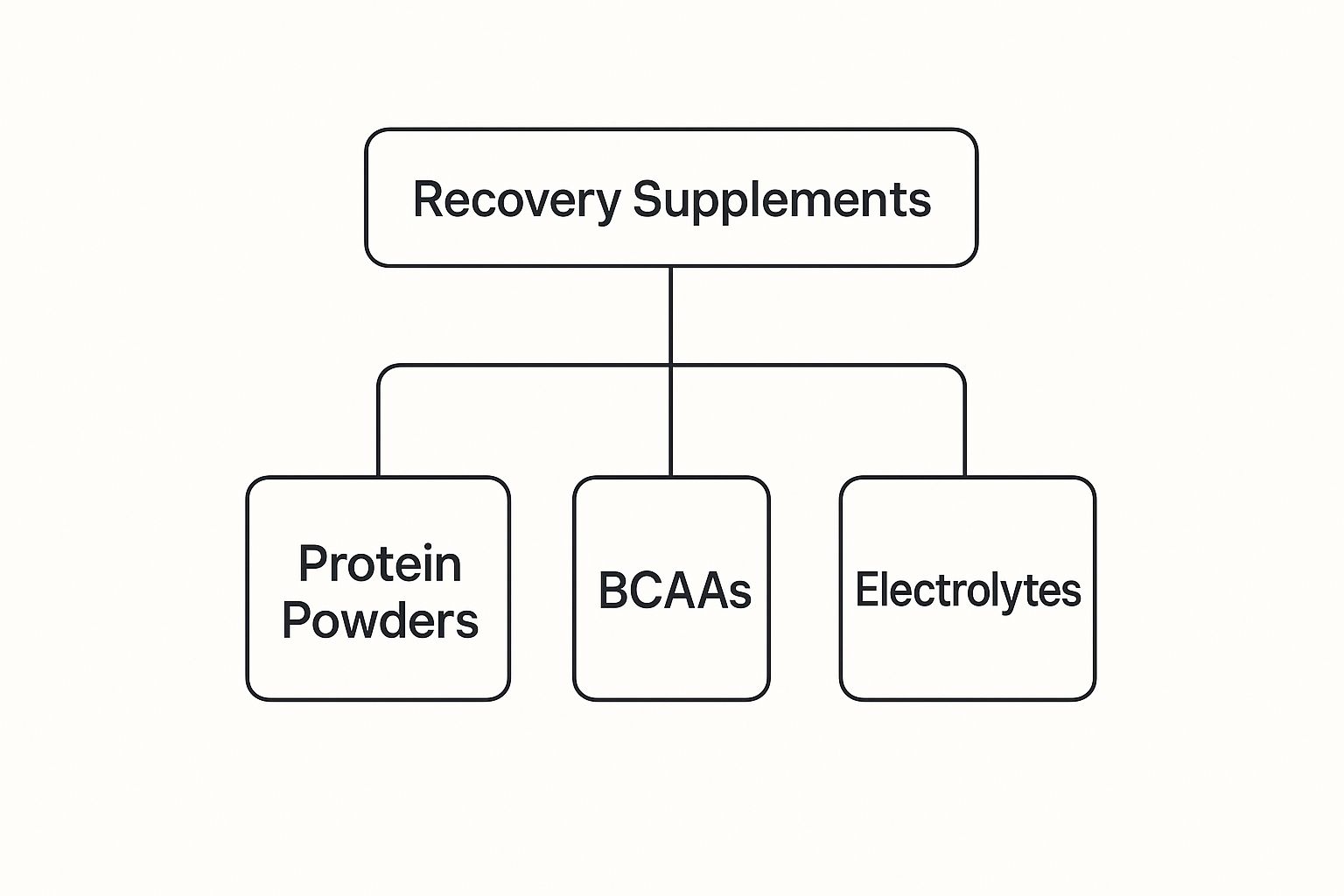
You can see how foundational elements like protein are supported by more specific aids like BCAAs and electrolytes to build a really complete recovery strategy.
Introduce One Supplement at a Time
This is the most important piece of advice: be patient. Never start taking multiple new supplements all at once. If you do, you'll have no idea which one is working—or which one might be causing a problem.
Action Step: Start with just one new supplement. Use it consistently for at least two to four weeks and track how you feel. Ask yourself: Am I performing better? Do I feel better? Is my recovery improving? This methodical approach is the only way to build a stack that is genuinely effective and personalised to you.
Remember that supplements are just that—supplementary. They’re the final 10%, designed to give you an edge on top of a solid foundation of consistent training, smart nutrition, and proper sleep. Follow this structured, tiered approach to create a personal plan that delivers real results and supports your athletic journey safely and effectively.
Frequently Asked Questions
It's normal to have questions when navigating sports nutrition. Here are answers to some of the most common ones to help you feel confident in your choices.
Do I Really Need Supplements To Be a Good Athlete?
No, you do not. Supplements are not a magic bullet. The real work is done by your training plan, a solid diet, and quality rest. Nothing replaces these fundamentals.
Think of supplements as the final 5%—use them to fine-tune performance or plug a specific nutritional gap. They can never replace the basics. Your first action should always be to apply a "food-first" mindset.
When’s the Best Time To Take Creatine?
The single most important factor with creatine is consistency. Take it every single day. This is what keeps your muscles topped up and ready to perform.
Some studies suggest that taking it post-workout with carbs and protein might offer a tiny boost, but the difference is minimal.
Actionable Advice: Take your daily dose whenever you're most likely to remember it. And yes, that includes your rest days—you must keep those muscle stores saturated.
Are More Expensive Protein Powders Actually Better?
Not always. A higher price usually reflects fancy branding, extra ingredients like digestive enzymes, or a more processed form of protein (like hydrolysate, which costs more to make than concentrate).
For most athletes, a good quality whey concentrate from a reputable brand will do the job perfectly. The most important action is to ensure it's third-party tested for purity—look for an Informed-Sport logo.
Focus on the protein content per serving and proof that it's clean from contaminants. Don't get caught up in the price tag. Often, the best supplements are the simplest ones.
Ready to support your body’s foundation with a natural, powerful blend of over 85 trace minerals? Oji Shilajit offers a convenient, great-tasting way to boost energy, enhance focus, and support hormonal balance. Find out how our premium Shilajit gummies can become a cornerstone of your wellness routine at https://myoji.co.uk.
Article created using Outrank


